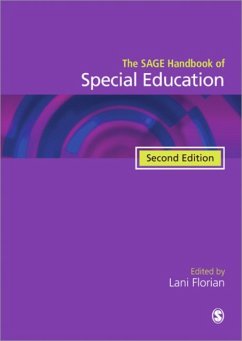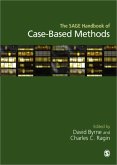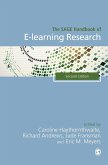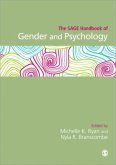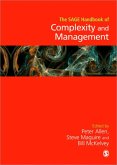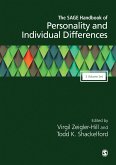The Sage Handbook of Special Education
Herausgeber: Florian, Lani
The Sage Handbook of Special Education
Herausgeber: Florian, Lani
- Broschiertes Buch
- Merkliste
- Auf die Merkliste
- Bewerten Bewerten
- Teilen
- Produkt teilen
- Produkterinnerung
- Produkterinnerung
'This comprehensive handbook extends and challenges existing thinking and practice about special education and its place in the larger education system. It provides a rich and valuable resource for advanced professional learning and is highly recommended.'Sharon P. Robinson, President & CEO, American Association of Colleges for Teacher Education
Andere Kunden interessierten sich auch für
![The SAGE Handbook of Case-Based Methods The SAGE Handbook of Case-Based Methods]() The SAGE Handbook of Case-Based Methods62,99 €
The SAGE Handbook of Case-Based Methods62,99 €![The SAGE Handbook of E-learning Research The SAGE Handbook of E-learning Research]() The SAGE Handbook of E-learning Research191,99 €
The SAGE Handbook of E-learning Research191,99 €![The SAGE Handbook of Gender and Psychology The SAGE Handbook of Gender and Psychology]() The SAGE Handbook of Gender and Psychology190,99 €
The SAGE Handbook of Gender and Psychology190,99 €![The SAGE Handbook of Complexity and Management The SAGE Handbook of Complexity and Management]() The SAGE Handbook of Complexity and Management192,99 €
The SAGE Handbook of Complexity and Management192,99 €![The SAGE Handbook of Mental Health and Illness The SAGE Handbook of Mental Health and Illness]() Herwig ReiterThe SAGE Handbook of Mental Health and Illness200,99 €
Herwig ReiterThe SAGE Handbook of Mental Health and Illness200,99 €![The SAGE Handbook of Modern Japanese Studies The SAGE Handbook of Modern Japanese Studies]() The SAGE Handbook of Modern Japanese Studies192,99 €
The SAGE Handbook of Modern Japanese Studies192,99 €![The Sage Handbook of Personality and Individual Differences The Sage Handbook of Personality and Individual Differences]() The Sage Handbook of Personality and Individual Differences676,99 €
The Sage Handbook of Personality and Individual Differences676,99 €-
-
-
'This comprehensive handbook extends and challenges existing thinking and practice about special education and its place in the larger education system. It provides a rich and valuable resource for advanced professional learning and is highly recommended.'Sharon P. Robinson, President & CEO, American Association of Colleges for Teacher Education
Hinweis: Dieser Artikel kann nur an eine deutsche Lieferadresse ausgeliefert werden.
Hinweis: Dieser Artikel kann nur an eine deutsche Lieferadresse ausgeliefert werden.
Produktdetails
- Produktdetails
- Verlag: SAGE Publications Ltd
- 2 Revised edition
- Seitenzahl: 1040
- Erscheinungstermin: 27. Dezember 2013
- Englisch
- Abmessung: 254mm x 179mm x 71mm
- Gewicht: 2182g
- ISBN-13: 9781446210536
- ISBN-10: 1446210537
- Artikelnr.: 39130376
- Herstellerkennzeichnung
- Libri GmbH
- Europaallee 1
- 36244 Bad Hersfeld
- gpsr@libri.de
- Verlag: SAGE Publications Ltd
- 2 Revised edition
- Seitenzahl: 1040
- Erscheinungstermin: 27. Dezember 2013
- Englisch
- Abmessung: 254mm x 179mm x 71mm
- Gewicht: 2182g
- ISBN-13: 9781446210536
- ISBN-10: 1446210537
- Artikelnr.: 39130376
- Herstellerkennzeichnung
- Libri GmbH
- Europaallee 1
- 36244 Bad Hersfeld
- gpsr@libri.de
List of Figures List of Tables Acknowledgements About the Editor About the Contributors Editorial Advisors Preface Introduction Part I: How Special Educational Needs Are Understood Reimagining Special Education - Why New Approaches are Needed - Lani Florian Confronting Difference: A Brief History of Special Education - Margaret A. Winzer Models of Service Delivery and Forms of Provision - Tony Cline & Norah Frederickson Categories of Special Educational Needs - Brahm Norwich The Disproportionate Placement of Ethnic Minorities in Special Education - Beth Harry A Sociological Perspective on Special Education - Sheila Riddell Social Justice in Education for Students with Disabilities - David J. Connor Part II: The Challenge of Inclusion Disability Rights in Education - Marcia Rioux Inclusive Education: From Targeting Groups and Schools to Achieving Quality Education as the Core of EFA - Renato Opertti, Zachary Walker & Yi Zhang From Special Education to Effective Schools for All: Widening the Agenda - Mel Ainscow Sui Ban Jiu Du: An Approach Toward Inclusive Education in China - Chunling Liu & Xueyun Su Entry, Engagement and Empowerment: Dilemmas for Inclusive Education in an Indian Context - Nidhi Singal Inclusive Schooling as a Means and End of Education? - Roger Slee Equity in Inclusive Education: A Cultural Historical Comparative Perspective - Elizabeth Kozleski, Alfredo Artiles & Federico Waitoller How Special Needs Funding Can Support Inclusive Education - Sip Jan Pijl Part III: Knowledge Production Epistemology and Special Education - Gary Thomas Persistent Issues in Behavioral Theory and Practice - John W. Maag Sociocultural Views of Learning - J. S. de Valenzuela Educational Neuroscience: Bridging the Gulf Between Basic Research and Implications for Practice - Usha Goswami Comparative and International Perspectives on Special Education - Justin J.W. Powell A Disability Studies Frame for Research Approaches in Special Education - Douglas Biklen, Fernanda Orsati & Jessica Bacon The Applied Science of Special Education: Quantitative Approaches, the Questions They Address, and How They Inform Practice - Samuel L. Odom & Kathleen Lynne Lane Researching Inclusive Classroom Practices: The Framework For - Kristine Black-Hawkins Research and Pupil Voice - Jill Porter Using the Capability Approach to Evaluate the Well-being of Adult learners with Dis/abilities Participation - Barbara Ridley & Michael F. Watts Part IV: Issues of Teaching Learning Without Limits: Constructing a Pedagogy Free from Determinist Beliefs about Ability - Susan Hart and Mary Jane Drummond Nothing Special - The Everyday Pedagogy of Teaching - Jonathan Rix and Kieron Sheehy Universal Design for Learning - David H. Rose, Jenna W. Gravel, and David T. Gordon Curriculum Considerations in Meeting the Educational Needs of Learners with Severe Intellectual Disabilities - Jean Ware Beyond Categories and Labels: Knowledge to Support Assessment for Learning. Disability
- A Problem Well Put? - Judith Hollenweger Assessment for Learning and the Journey Towards Inclusion - Louise Hayward Self-Assessment as an
Insider
Lens for Learning and Assessment - Roseanna Bourke and Mandia Mentis Dynamic Assessment and Cognitive Intervention - Alex Kozulin Expanding Approaches to Summative Assessment for Students with Impairment - J. Joy Cumming & Graham S. Maxwell Instructional and Assessment Accommodations in the 21st Century - Martha L. Thurlow Teaching and Learning in the Early Years - Susan A. Fowler, Michaelene M. Ostrosky and Tweety J. Yates Teaching Elementary Students with Learning Difficulties - Sharon Vaughn, Jeanne Wanzek & Carolyn A. Denton Secondary Special Education and Inclusive Practice: Pitfalls and Potential for the Success of All - Lisa A. Dieker and Selma Powell Students with Disabilities in Postsecondary Education - Robert Stodden and Kelly Roberts Teacher Assistants in Inclusive Classrooms - Michael F. Giangreco and Mary Beth Doyle Assistive Technology to Provide Access to the Curriculum and Increase Independence - Amy G. Dell and Deborah A. Newton Mobile Learning and Games in Special Education - Penny Standen and David Brown The Evolving Use of Technology in Special Education: Is "Effectiveness" the Right question? - John Woodward & Ralph Ferretti Friendships and Peer Relations Among and Between Children and Young People With and Without Learning Difficulties and/or Disabilities - Dawn B. Male Finding a Voice: Families Roles in Schools - Dianne L. Ferguson, Amy N. Hanreddy and Philip M. Ferguson Interagency Working and Special Education: Beyond
Virtuous
Ideas of Partnership towards Alternative Frameworks for Collaborative Work with Children - Liz Todd Part V: Future Directions For Research and Practice Education Without Condescension: Philosophy, Personhood and Cognitive Disability - Ruth Cigman Challenging Orthodoxy in Special Education: On Longstanding Debates and Philosophical Divides Revisited - Deborah J. Gallagher What do Classroom Teachers Need to Know about Meeting Special Educational Needs? - Ruth Kershner The Professional Knowledge of Special Educators - Kari Nes Inquiry and Community: Uncommon Opportunities to Enrich Professional Development for Inclusion - Marleen C. Pugach & Linda P. Blanton Changing Perspectives of Special Education in the Evolving Context of Standards-Based Reforms in the US and England - Margaret J. McLaughlin and Alan Dyson Medicalization in Schools - Valerie Harwood and Samantha McMahon Special Education and its Contribution to the Broader Discourse of Education - Seamus Hegarty Glossary - Cristina Devecchi
- A Problem Well Put? - Judith Hollenweger Assessment for Learning and the Journey Towards Inclusion - Louise Hayward Self-Assessment as an
Insider
Lens for Learning and Assessment - Roseanna Bourke and Mandia Mentis Dynamic Assessment and Cognitive Intervention - Alex Kozulin Expanding Approaches to Summative Assessment for Students with Impairment - J. Joy Cumming & Graham S. Maxwell Instructional and Assessment Accommodations in the 21st Century - Martha L. Thurlow Teaching and Learning in the Early Years - Susan A. Fowler, Michaelene M. Ostrosky and Tweety J. Yates Teaching Elementary Students with Learning Difficulties - Sharon Vaughn, Jeanne Wanzek & Carolyn A. Denton Secondary Special Education and Inclusive Practice: Pitfalls and Potential for the Success of All - Lisa A. Dieker and Selma Powell Students with Disabilities in Postsecondary Education - Robert Stodden and Kelly Roberts Teacher Assistants in Inclusive Classrooms - Michael F. Giangreco and Mary Beth Doyle Assistive Technology to Provide Access to the Curriculum and Increase Independence - Amy G. Dell and Deborah A. Newton Mobile Learning and Games in Special Education - Penny Standen and David Brown The Evolving Use of Technology in Special Education: Is "Effectiveness" the Right question? - John Woodward & Ralph Ferretti Friendships and Peer Relations Among and Between Children and Young People With and Without Learning Difficulties and/or Disabilities - Dawn B. Male Finding a Voice: Families Roles in Schools - Dianne L. Ferguson, Amy N. Hanreddy and Philip M. Ferguson Interagency Working and Special Education: Beyond
Virtuous
Ideas of Partnership towards Alternative Frameworks for Collaborative Work with Children - Liz Todd Part V: Future Directions For Research and Practice Education Without Condescension: Philosophy, Personhood and Cognitive Disability - Ruth Cigman Challenging Orthodoxy in Special Education: On Longstanding Debates and Philosophical Divides Revisited - Deborah J. Gallagher What do Classroom Teachers Need to Know about Meeting Special Educational Needs? - Ruth Kershner The Professional Knowledge of Special Educators - Kari Nes Inquiry and Community: Uncommon Opportunities to Enrich Professional Development for Inclusion - Marleen C. Pugach & Linda P. Blanton Changing Perspectives of Special Education in the Evolving Context of Standards-Based Reforms in the US and England - Margaret J. McLaughlin and Alan Dyson Medicalization in Schools - Valerie Harwood and Samantha McMahon Special Education and its Contribution to the Broader Discourse of Education - Seamus Hegarty Glossary - Cristina Devecchi
List of Figures List of Tables Acknowledgements About the Editor About the Contributors Editorial Advisors Preface Introduction Part I: How Special Educational Needs Are Understood Reimagining Special Education - Why New Approaches are Needed - Lani Florian Confronting Difference: A Brief History of Special Education - Margaret A. Winzer Models of Service Delivery and Forms of Provision - Tony Cline & Norah Frederickson Categories of Special Educational Needs - Brahm Norwich The Disproportionate Placement of Ethnic Minorities in Special Education - Beth Harry A Sociological Perspective on Special Education - Sheila Riddell Social Justice in Education for Students with Disabilities - David J. Connor Part II: The Challenge of Inclusion Disability Rights in Education - Marcia Rioux Inclusive Education: From Targeting Groups and Schools to Achieving Quality Education as the Core of EFA - Renato Opertti, Zachary Walker & Yi Zhang From Special Education to Effective Schools for All: Widening the Agenda - Mel Ainscow Sui Ban Jiu Du: An Approach Toward Inclusive Education in China - Chunling Liu & Xueyun Su Entry, Engagement and Empowerment: Dilemmas for Inclusive Education in an Indian Context - Nidhi Singal Inclusive Schooling as a Means and End of Education? - Roger Slee Equity in Inclusive Education: A Cultural Historical Comparative Perspective - Elizabeth Kozleski, Alfredo Artiles & Federico Waitoller How Special Needs Funding Can Support Inclusive Education - Sip Jan Pijl Part III: Knowledge Production Epistemology and Special Education - Gary Thomas Persistent Issues in Behavioral Theory and Practice - John W. Maag Sociocultural Views of Learning - J. S. de Valenzuela Educational Neuroscience: Bridging the Gulf Between Basic Research and Implications for Practice - Usha Goswami Comparative and International Perspectives on Special Education - Justin J.W. Powell A Disability Studies Frame for Research Approaches in Special Education - Douglas Biklen, Fernanda Orsati & Jessica Bacon The Applied Science of Special Education: Quantitative Approaches, the Questions They Address, and How They Inform Practice - Samuel L. Odom & Kathleen Lynne Lane Researching Inclusive Classroom Practices: The Framework For - Kristine Black-Hawkins Research and Pupil Voice - Jill Porter Using the Capability Approach to Evaluate the Well-being of Adult learners with Dis/abilities Participation - Barbara Ridley & Michael F. Watts Part IV: Issues of Teaching Learning Without Limits: Constructing a Pedagogy Free from Determinist Beliefs about Ability - Susan Hart and Mary Jane Drummond Nothing Special - The Everyday Pedagogy of Teaching - Jonathan Rix and Kieron Sheehy Universal Design for Learning - David H. Rose, Jenna W. Gravel, and David T. Gordon Curriculum Considerations in Meeting the Educational Needs of Learners with Severe Intellectual Disabilities - Jean Ware Beyond Categories and Labels: Knowledge to Support Assessment for Learning. Disability
- A Problem Well Put? - Judith Hollenweger Assessment for Learning and the Journey Towards Inclusion - Louise Hayward Self-Assessment as an
Insider
Lens for Learning and Assessment - Roseanna Bourke and Mandia Mentis Dynamic Assessment and Cognitive Intervention - Alex Kozulin Expanding Approaches to Summative Assessment for Students with Impairment - J. Joy Cumming & Graham S. Maxwell Instructional and Assessment Accommodations in the 21st Century - Martha L. Thurlow Teaching and Learning in the Early Years - Susan A. Fowler, Michaelene M. Ostrosky and Tweety J. Yates Teaching Elementary Students with Learning Difficulties - Sharon Vaughn, Jeanne Wanzek & Carolyn A. Denton Secondary Special Education and Inclusive Practice: Pitfalls and Potential for the Success of All - Lisa A. Dieker and Selma Powell Students with Disabilities in Postsecondary Education - Robert Stodden and Kelly Roberts Teacher Assistants in Inclusive Classrooms - Michael F. Giangreco and Mary Beth Doyle Assistive Technology to Provide Access to the Curriculum and Increase Independence - Amy G. Dell and Deborah A. Newton Mobile Learning and Games in Special Education - Penny Standen and David Brown The Evolving Use of Technology in Special Education: Is "Effectiveness" the Right question? - John Woodward & Ralph Ferretti Friendships and Peer Relations Among and Between Children and Young People With and Without Learning Difficulties and/or Disabilities - Dawn B. Male Finding a Voice: Families Roles in Schools - Dianne L. Ferguson, Amy N. Hanreddy and Philip M. Ferguson Interagency Working and Special Education: Beyond
Virtuous
Ideas of Partnership towards Alternative Frameworks for Collaborative Work with Children - Liz Todd Part V: Future Directions For Research and Practice Education Without Condescension: Philosophy, Personhood and Cognitive Disability - Ruth Cigman Challenging Orthodoxy in Special Education: On Longstanding Debates and Philosophical Divides Revisited - Deborah J. Gallagher What do Classroom Teachers Need to Know about Meeting Special Educational Needs? - Ruth Kershner The Professional Knowledge of Special Educators - Kari Nes Inquiry and Community: Uncommon Opportunities to Enrich Professional Development for Inclusion - Marleen C. Pugach & Linda P. Blanton Changing Perspectives of Special Education in the Evolving Context of Standards-Based Reforms in the US and England - Margaret J. McLaughlin and Alan Dyson Medicalization in Schools - Valerie Harwood and Samantha McMahon Special Education and its Contribution to the Broader Discourse of Education - Seamus Hegarty Glossary - Cristina Devecchi
- A Problem Well Put? - Judith Hollenweger Assessment for Learning and the Journey Towards Inclusion - Louise Hayward Self-Assessment as an
Insider
Lens for Learning and Assessment - Roseanna Bourke and Mandia Mentis Dynamic Assessment and Cognitive Intervention - Alex Kozulin Expanding Approaches to Summative Assessment for Students with Impairment - J. Joy Cumming & Graham S. Maxwell Instructional and Assessment Accommodations in the 21st Century - Martha L. Thurlow Teaching and Learning in the Early Years - Susan A. Fowler, Michaelene M. Ostrosky and Tweety J. Yates Teaching Elementary Students with Learning Difficulties - Sharon Vaughn, Jeanne Wanzek & Carolyn A. Denton Secondary Special Education and Inclusive Practice: Pitfalls and Potential for the Success of All - Lisa A. Dieker and Selma Powell Students with Disabilities in Postsecondary Education - Robert Stodden and Kelly Roberts Teacher Assistants in Inclusive Classrooms - Michael F. Giangreco and Mary Beth Doyle Assistive Technology to Provide Access to the Curriculum and Increase Independence - Amy G. Dell and Deborah A. Newton Mobile Learning and Games in Special Education - Penny Standen and David Brown The Evolving Use of Technology in Special Education: Is "Effectiveness" the Right question? - John Woodward & Ralph Ferretti Friendships and Peer Relations Among and Between Children and Young People With and Without Learning Difficulties and/or Disabilities - Dawn B. Male Finding a Voice: Families Roles in Schools - Dianne L. Ferguson, Amy N. Hanreddy and Philip M. Ferguson Interagency Working and Special Education: Beyond
Virtuous
Ideas of Partnership towards Alternative Frameworks for Collaborative Work with Children - Liz Todd Part V: Future Directions For Research and Practice Education Without Condescension: Philosophy, Personhood and Cognitive Disability - Ruth Cigman Challenging Orthodoxy in Special Education: On Longstanding Debates and Philosophical Divides Revisited - Deborah J. Gallagher What do Classroom Teachers Need to Know about Meeting Special Educational Needs? - Ruth Kershner The Professional Knowledge of Special Educators - Kari Nes Inquiry and Community: Uncommon Opportunities to Enrich Professional Development for Inclusion - Marleen C. Pugach & Linda P. Blanton Changing Perspectives of Special Education in the Evolving Context of Standards-Based Reforms in the US and England - Margaret J. McLaughlin and Alan Dyson Medicalization in Schools - Valerie Harwood and Samantha McMahon Special Education and its Contribution to the Broader Discourse of Education - Seamus Hegarty Glossary - Cristina Devecchi

